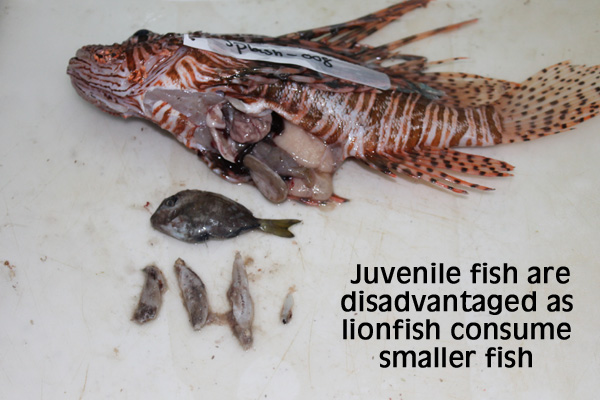The lionfish are destructive marine creatures which are threatening the survival of other marine species, as well as the health of the coral reef.
As the lionfish population continues to increase, the coral reef ecosystem is being progressively degraded. Lionfish are predators to crustaceans and many other fishes. One lionfish can consume multiple small fish species at a time. The excessive consumption of juvenile fish, which are critical to the rest of the food chain, puts many fish species at a great disadvantage. Additionally, the fish hunted by lionfish also include those that help to protect the coral reef.
One aim of Oceana in Belize’s Juvenile Fish Protection Campaign is to spread awareness of the effects of the lionfish on marine life. On June 28, 2013, Oceana sponsored a lionfish catching competition that took place just outside of Placencia Village as a part of the 2013 Placencia Lobster Fest activities.
Oceana in Belize Vice-president Audrey Matura-Shepherd said that the severity of the issue requires that it be addressed speedily, and they plan on using the annual competition as one way of doing so.
“Many people in Belize are not giving enough attention to the critical nature of a lionfish, so we have teamed up with S.E.A. [Southern Environmental Association] and with the Placencia Producers Cooperative to be able to promote this competition with the hope that by us getting involved, every year more and more people will get involved and give attention to the gravity of the issue,” she said.
Matura-Shepherd said that the only way the population of the fish can be reduced is for Belizean fishers to personally catch them and to aim at catching the younger ones in order to discourage reproduction.
Indeed the fish is poisonous, but after it has undergone the necessary procedures to remove its poisonous substances, the lionfish can serve as another tasty marine delicacy. The demand for the fish is growing.
“We need to make a lionfish industry; we need to encourage fishers to go out and capture this fish,” Matura-Shepherd said. “Of course we need to have a market. It is really a most delectable type of fish to eat. The lionfish ceviche is one of the most delicious you’ll ever have. So I think if you get more fishers involved we can get consumers aware that they can have this type of fish consumed and that it’s not poisonous, it’s not going to kill them. I think if we develop a policy, hopefully we’ll overfish it and we’ll help bring back the balance we need,” she explained.
Jennifer Chapman, marine biologist and country coordinator for Blue Ventures, said that one of the primary objectives of their work is to develop a market for the lionfish for both local consumption and export.
“They [lionfish] provide us with an alternative sustainable environmentally-sensitive fishery,” she said. “It has great potential, it tastes delicious. And through interviews and questionnaires with locals, tourists and restaurant owners we discovered that one of the major barriers to actually have this market taking off is the essential handling facility,” Chapman noted.
Chapman said that potential buyers for the lionfish need a reliable source of supply. No one was handling lionfish in Belize, but in February of this year the Placencia fishermen’s cooperative decided to become suppliers.
“Sustainable species [are] in high demand in western markets, particularly western markets in the US; people pay twice the price if they know that it comes with the sustainable stamp,” she said. “Lionfish sells at extremely high prices in American restaurants and the willingness to pay for lionfish throughout Belize is really quite high. So we believe that fishermen are “gonna” be able to receive more than what they would for their average snapper or grouper fillet. And furthermore, it doesn’t have a seasonal closure or size limit. This is one we want to overfish,” she stated.
There is now an export facility in Placencia and it has been approved by the Food and Drug Administration and Belize Agricultural Health Authority. Chapman said they have already set up partnerships with groups in the United States and the first test run should be today, Monday. That shipment will include some of the catch from the competition.
Several teams participated in the competition on Friday and prizes were given for the most lionfish caught, largest lionfish by weight and smallest lionfish by weight.
Splash Dive was given the prize for the most catch and for the smallest lionfish caught, and received $1,500 and $800 respectively. The Placencia Producers Cooperative was given the prize for the largest lionfish caught and was awarded $500.

